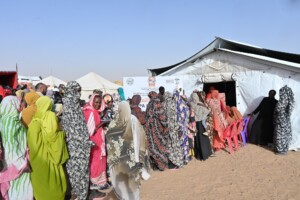Research series to highlight role of Sudan’s militias
The Sudan Democracy First Group (SDFG) has published the first in a series of articles entitled Militias of Bashir’s Regime and the Proxy War, to provide inside into the militias’ roles in Sudan’s multiple wars and to reveal resultant political, security and social implications from their inception and activities.
The Sudan Democracy First Group (SDFG) has published the first in a series of articles entitled Militias of Bashir’s Regime and the Proxy War, to provide inside into the militias’ roles in Sudan’s multiple wars and to reveal resultant political, security and social implications from their inception and activities.
The SDFG was formed as an umbrella group of leading Sudanese independent and democratic civil society and media actors to serve as a think tank and venue for indigenous research, analysis and advocacy on human rights, development, peace and democratic transformation in Sudan.
The first part of the research series covers the role of foreign militias from Maban County in South Sudan, which have been formed and supported by the Sudanese government, to play a crucial role in fighting a proxy-war. In addition, it will also shed light on the role of local militias used by Khartoum to fuel the conflict.
“Throughout its rule, the National Congress Party (NCP) established an infamous reputation of relying heavily on militias outside of the Sudan Armed Forces (SAF), in managing its multiple wars in Darfur, Blue Nile, and South Kordofan/ Nuba Mountains,” the SDFG says in its launch statement.
“The regime bases their recruitment strategies on the politicizing of ethnic relations and the manipulations of tribal affiliations, as well as offering financial temptations to new recruits. The reliance on these militias increased steadily within recent years, providing them with needed weaponry and logistics. The support provided contributes to operations within Sudan and neighbouring countries, serving the various goals and objectives of the regime.
“The rise of militias is the result of a number of interrelating factors, such as declining loyalty of SAF forces towards the ruling party, caused by dissatisfaction evolving ranks and promotions within the SAF; crimes committed by militias in the on-going conflicts as well as continuous fighting in absence of a clear political will from side of the government, to reach a comprehensive political solution to end conflict.”
View the first part of the series here: Militias of Bashir’s Regime and the Proxy War (1). War in the Blue Nile: Militias in the hunt of refugees and displaced population











 and then
and then